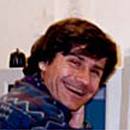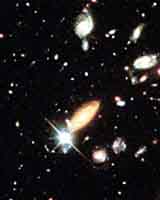|
Alex Filippenko
–
astronomer
|

|
"
Some ideas initially seem implausible, but upon further exploration yield significant new insights, and occasionally even revolutions.
" |

|
| |
|
|
|
| |
How were you motivated to become an astronomer? |
| |
I've always been interested in science. After playing with chemistry sets, microscopes, and circuit boards in my youth, a telescope was the natural next step –– it would provide a window to the Universe as a whole. I requested and received a small telescope as a Christmas gift in 1972, when I was 14 years old. That evening, after setting it up, I took my first close look at a star through the telescope. It seemed brighter, providing a small thrill, but the second star I viewed was much the same, revealing no details of its nature due to its great distance. Deciding that I needed to consult an astronomy book in order to find a list of visually interesting objects, I nearly quit for the night, but not until I had examined one final star. Initially frustrated because the image seemed out of focus and jiggly, I released the focus knob and let the telescope settle down. And then, to my utter amazement, I saw a small disk surrounded by exquisite rings –– I was looking at Saturn! The sight nearly knocked my socks off. That night, I had discovered Saturn. It didn't matter that millions of people had previously seen it, because I found it on my own, and at that moment it was all mine. From then on, the thrill of scientific discovery was permanently etched in my mind.
Bitten by the bug that evening, astronomy became a fun hobby for the next few years, although my main focus remained chemistry. I even entered college as a chemistry major, but during my first year it became clear that the physics of atoms and molecules most strongly appealed to me. Moreover, an introductory astronomy course taught me that the behavior of matter on the smallest scales plays a crucial role in determining the structure of planets, stars, and the entire Universe. I realized that astronomy provided an opportunity to study the Universe on the smallest and largest scales, thereby satisfying my curiosity about a wide variety of natural phenomena. I switched from chemistry to physics at the end of that first year, with the intention of becoming an astrophysicist, and I've never looked back. It's been a truly wonderful ride.
|
|

|
| |
|
|
|
| |
What can you share about your creative process? |
| |

|
|
Perhaps of greatest importance is an active, insatiable curiosity about the workings of nature, and a desire to contribute to their understanding. In the first grade, I played with magnets and was intrigued by how they would attract or repel each other, depending on their relative orientation. What was this very real but invisible force? Dragging the magnets through a sandbox, they became covered with little black specks. What were they, and how did they get there? (They were bits of natural iron, it turns out.) A library book showed me how to build a simple electromagnet out of a nail, some wire, and a battery –– making me the "master" of this force and, more significantly, providing a clue that it had something to do with electricity. It was not until my second year in college that I finally began to understand the intricate details of magnetism, but the creative spark had been ignited years earlier, leading to explorations of many aspects of the physical world.
An open mind, willing to consider things from a different perspective, is definitely an asset. Some ideas initially seem implausible, but upon further exploration yield significant new insights, and occasionally even revolutions. The development of quantum mechanics provides a good example: without direct supporting evidence, who would have originally thought that the behavior of atomic and subatomic particles is inherently probabilistic? Of course, one should not ignore existing experimental constraints, if these were obtained with great care and attention to detail; any new theory must account for them. In science, the final judgment is made by comparison with data: if a hypothesis disagrees with observations whose integrity is beyond doubt, then it must be revised or discarded.
|
|
| |
|
|
|
| |
What ideas do you have for a future human community on Mars?
|
| |
The exploration of Mars is an excursion into our origins: Mars and Earth
formed from the same ancient disk of gas and dust, and a complete understanding
of our planet probably requires deeper knowledge of what makes Mars so similar
yet so different. Mars is also a natural step in our quest to journey into the
cosmos, probably after establishing a lunar outpost. But beyond this, the
colonization of Mars is an effort to preserve the human race at an advanced
technological level. By moving some of us to Mars, even with an initial
community of only a few hundred pioneers, we reduce our chance of total
extinction or of a catastrophe that returns us to a primitive state. Our
long-term existence on Earth is threatened in a variety of ways, most of
astronomical or terrestrial origin (e.g., collisions with comets; the eventual
death of the Sun; an unstoppable killer virus), others perhaps of our own
creation (e.g., global warfare; human–induced climate change). With our
presence on two planets, some of these risks are substantially reduced; for
example, Earth and Mars are unlikely to both collide with an asteroid in a
short time interval. In addition, this bold step should eventually lead to the
colonization of other planetary systems, broadening our range of habitats.
To acquire this longevity, however, we must make progress in curbing our own
self–destructive tendencies. With Mars we get a fresh start: if we examine our
past mistakes, and think carefully about how to avoid them, we may become more
resilient to the self-inflicted wounds so common of humans on Earth. This will
give us the opportunity to propagate our intelligence through the vast
Milky Way Galaxy, and to further explore the mysteries of our magnificent
Universe. Who knows what humans (or their evolutionary descendents) will learn
and achieve... if given enough time.
|
|

|
|




